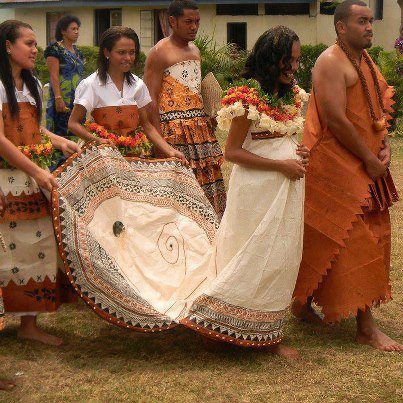Traditional & Cultural Dresses in Fiji
Fiji’s cultural attire is a blend of indigenous iTaukei traditions, Indo-Fijian influences, and modern Pacific fashion. Traditional clothing is worn during ceremonies, weddings, festivals, pageants, school events, and national holidays like Fiji Day.
1. iTaukei (Indigenous Fijian) Traditional Attire
For Women:
- Sulu Jaba (or Jaba):
- A formal two-piece outfit consisting of a long skirt (sulu) and a matching top with short or puffed sleeves.
- Often made from bright, patterned fabrics.
- Worn during church, weddings, and official gatherings.
- Tapa cloth dress (masi dress):
- Worn on special occasions like weddings and cultural events.
- Made from barkcloth (masi), decorated with tribal designs and earthy dyes.
- Accessories: Shell necklaces, flower garlands (salusalu), and hibiscus flowers in hair.
For Men:
- Sulu vakataga (formal sulu):
- A tailored skirt-like garment (like a kilt) worn with a dress shirt and sometimes a jacket or bula shirt.
- Traditional but used in modern formal and professional settings.
- Tapa cloth wrap (masi wrap):
- Worn during cultural or chiefly ceremonies, usually tied around the waist or over the shoulder.
- Accessories: Woven mats, coconut-leaf belts, and tribal arm bands for warriors in performances.
2. Indo-Fijian Traditional Dress
For Women:
- Sari – Long colorful cloth wrapped elegantly with a blouse.
- Salwar Kameez – Popular among Indo-Fijian women for casual or formal wear.
- Often worn during Diwali, Holi, weddings, and Indian community events.
For Men:
- Kurta – Long shirt worn over trousers or dhoti for cultural or religious events.
- Worn especially during Hindu festivals or Muslim Eid celebrations.
3. Everyday Fijian Wear (Modern Traditional)
| Garment | Description |
|---|---|
| Bula Shirt | Fiji’s version of a Hawaiian shirt; worn by both men and women. It is colorful and often floral. Considered formal in workplaces. |
| Sulu (unisex) | A common wraparound skirt. Men wear it with T-shirts; women wear longer versions as skirts or dresses. |
| Masi or tapa garments | Still used during traditional dances and cultural shows. |
4. Where You’ll See Traditional Dress
- Cultural festivals (e.g., Hibiscus Festival, Fiji Day)
- Traditional weddings
- Chiefly ceremonies
- School cultural days
- Pageants and performances



